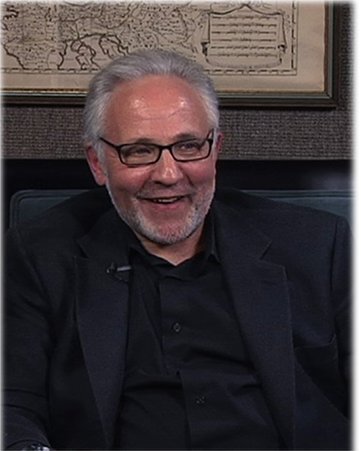 |
James Mann
...reporter and author. Prior to devoting full time to books, Mr. Mann was an award-winning Washington reporter, columnist, and foreign correspondent for 20 years at the Los Angeles TImes. The Rebellion of Ronald Reagan: A History of the End of the Cold War further enhances the Mr. Mann’s keen observations in his bestseller Rise of the Vulcans, bringing to clearer focus the individuals and influence of American conservatives and neoconservatives from the Nixon Administration forward. His several books on China include the best-seller, The China Fantasy. He is author in residence at the prestigious Johns Hopkins School of Advanced International Studies and lives near Washington, D.C. |
As President, Ronald Reagan turned against nuclear weapons and actively worked against them, despite resistance from conservatives, the Pentagon and National Security apparatus, says James Mann. This widely respected journalist challenges stereotypes long held at both ends of the conventional political spectrum.
“I think that Reagan changed in office. You can’t look at the evidence without realizing that certainly by his last 5 years on office, Reagan was doing what he could to cut back on nuclear weapons.”
Mr. Mann believes he knows why the archtypal Cold Warrior Reagan did an about-face.
“By the fall of ’83, Reagan had been introduced to the nuclear war plans. They were scary. And scary to him.
“Secondly, there was an instant -- during NATO exercises -- when British and American espionage agents working inside the Soviet Union said, ‘The Soviets are genuinely scared that nuclear war is about to break out.’ Reagan said, ‘Can they really believe that we’re about to launch a nuclear attack?’ And he came to think about the misunderstandings.
“And then the third thing that we can’t leave out, because it’s really important, is that there was a Nuclear Freeze movement that was against Reagan in ’81, certainly in ’82. In ’83 there was a movie that got produced on the nuclear freeze movement that showed on TV and Reagan saw it. So he was also responding to (public) sentiment as well.”
With the world’s political landscape now changing again, Mr. Mann urges a closer look at the end of the Cold War.
“It’s important to know whether the Cold War ended because the United States forced the Soviet Union to collapse, or whether the Soviet Union under Gorbachev decided to abandon the field.
“It ended in ’89, with the Berlin Wall coming down, all the changes in Eastern Europe. Why? Because the Soviet Union didn’t intervene to stop this the way it had in Poland before, and in Czechoslovakia, Hungary.
“Why didn’t Gorbachev intervene? Was he thinking, ‘Omigosh, there’s a Strategic Defense Initiative so I better not intervene in East Germany’? No. He didn’t intervene because he thought he had -- wanted -- an entirely new relationship with the West."
With only a single superpower left, why the explosion in U.S. military?
“You get this very brief period -- late ‘80s/early ‘90s, when a preoccupying question in Washington is, ‘What do we need this huge military for?’ Colin Powell, Chairman of the Joint Chiefs of Staff, says, ‘I’m beginning to run out of enemies, I’m down to Fidel Castro and Kim Il Sung.’ You get debates about a peace dividend. Well, in fact, what happens is that you get new rationales and new rationalizations for a large American military.”
Who pushes those? The people Mr. Mann covered in his best selling Rise of the Vulcans focused on George W. Bush’s “War Cabinet”.
“The common denominator (for Cheney, Rumsfeld, Powell, Rice, Wolfowitz and Armitage) is that they had served in the (G.H.W.) Bush, Reagan or Ford Administration, even Nixon for Rumsfeld. But where did they serve? The real locus was the Pentagon, either as a civilian military person or a career military official. It didn’t matter which wing of the George W. Bush Administration you were in, your familiarity with foreign policy came from the military. This is still a bit of a problem.”
[This Program was recorded March 11, 2009, in Atlanta, Georgia, U.S.]
audio content:
Conversation 1 |
Conversation 2 |
Conversation 3 |
Conversation 4 |
Conversation 5 |
Conversation 6 |
6:07 |
12:39 |
10:37 |
9:09 |
7:39 |
|
 |
 |
 |
 |
 |


